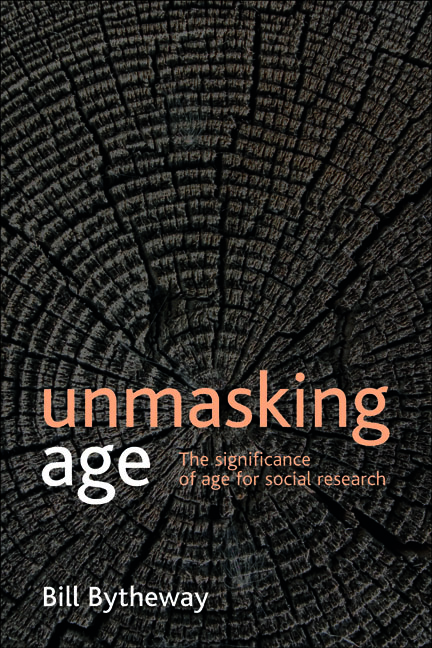Book contents
- Frontmatter
- Dedication
- Contents
- List of figures and tables
- Acknowledgements
- one Introducing age
- two Researching age
- three Age and time
- four Representations of age
- five Growing older in an ageing body
- six Being older
- seven A great age
- eight The ageing population
- nine Gerontologists and older people
- ten Getting real
- Postscript
- Notes
- Appendix
- References
- Index
eight - The ageing population
Published online by Cambridge University Press: 07 September 2022
- Frontmatter
- Dedication
- Contents
- List of figures and tables
- Acknowledgements
- one Introducing age
- two Researching age
- three Age and time
- four Representations of age
- five Growing older in an ageing body
- six Being older
- seven A great age
- eight The ageing population
- nine Gerontologists and older people
- ten Getting real
- Postscript
- Notes
- Appendix
- References
- Index
Summary
The popular media often expresses its concern about ‘the ageing population’. How is the population ageing? To answer this basic question, it is necessary to consider first the concept of population and how demographers have studied it.
Although demography, defined as the statistical study of human populations, has developed the tools for analysing any collection of people, much of its literature focuses on nation states and their constituent populations. This is driven by the politics of nationhood. It is in this context, for example, that universal suffrage has been promoted, and it follows directly from this that democracy depends upon there being the political will to identify and register a nation's population. Moreover, policies regarding ‘public health’ can only be effective if the health of the public (that is, the population) is systematically monitored. These and other national concerns require the compilation of statistics based (a) on periodic censuses that count and locate the national population, and (b) on systems for monitoring the ‘flow’ of people entering the population (the newborn and immigrants) and leaving it (the deceased and emigrants).
A census can produce the age distribution of the population by recording the chronological age of each person counted. The overall population is then described as ageing if between two censuses the average age rises. Throughout most of the past few centuries, the average age of most national populations has indeed been rising and it is often assumed that this implies greater numbers of old people. It may, however, be due to a falling birth rate just as much as a falling death rate and it does not necessarily follow that there are more old people. The average age of the population will increase if there is a falling birth rate while death rates remain the same. That said, the evidence is that, in the first decade of the 21st century, life expectancy is increasing in many countries and this, not surprisingly, concerns those with responsibilities for the costs of pensions, healthcare and various other forms of welfare arising from the needs of older people. This concern generates political debate and it is here that panic often takes over.
- Type
- Chapter
- Information
- Unmasking AgeThe Significance of Age for Social Research, pp. 163 - 186Publisher: Bristol University PressPrint publication year: 2011



